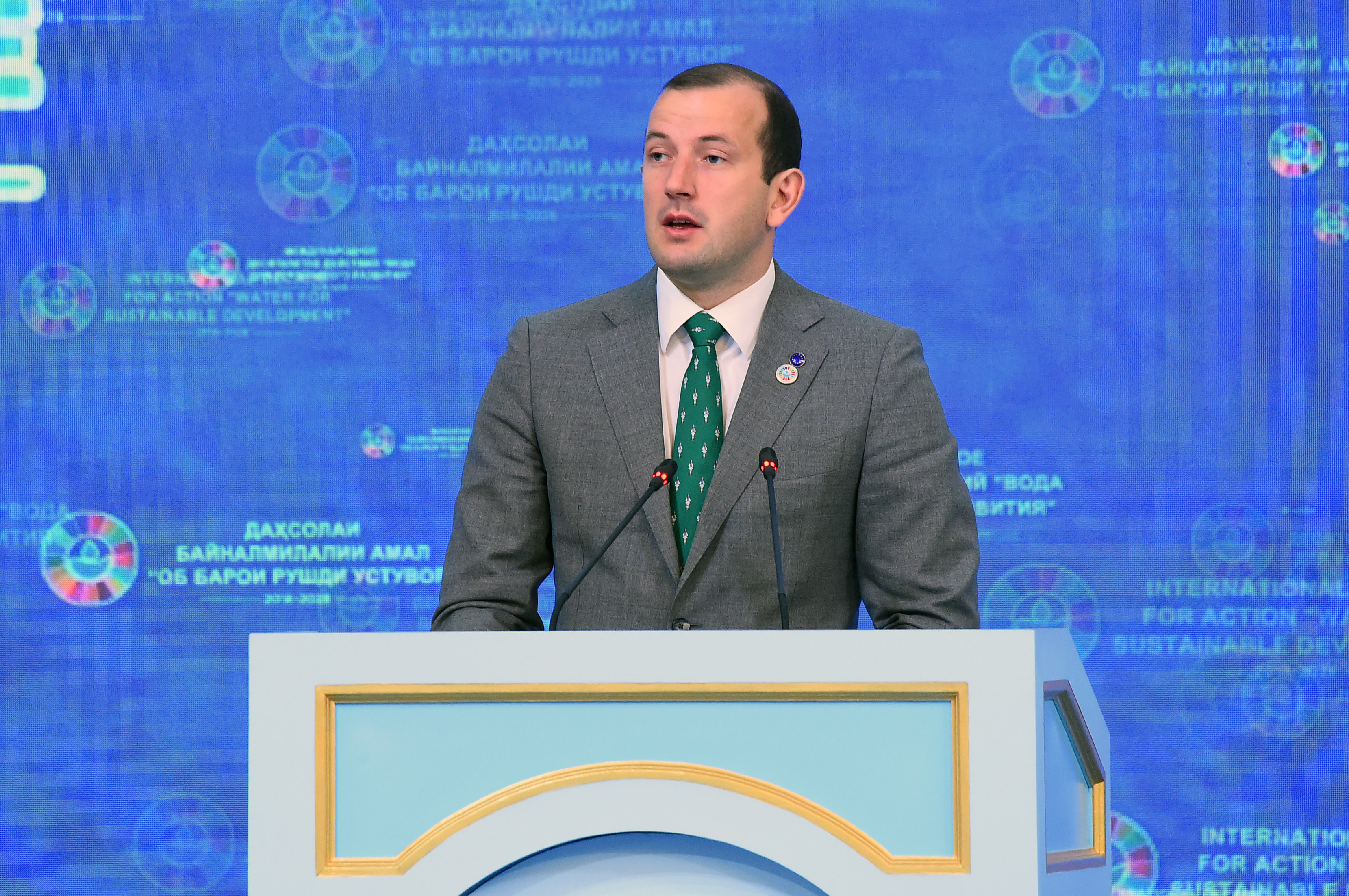Dushanbe Water Process 2nd High-Level International Conference on the International Decade for Action ‘Water for Sustainable Development’ | Hybrid, Tajikistan, 6-8 June 2022

date: 01/07/2022
On 6-9 June, the European Union delegation led by Mr. Virginijus Sinkevičius, European Commissioner for Environment, Oceans and Fisheries, with Ms Terhi Hakala, EU Special Representative for Central Asia and Ms Marjeta Jager, Deputy Director-General for International Cooperation and Development (INTPA), participated in the 2nd International High-Level Conference on International Decade for Action “Water for Sustainable Development 2018-2028”. They also held bilateral meetings with representatives of the Government of Tajikistan and international partners and signed important water projects.
On 6 June 2022, Commissioner Sinkevičius opened the Youth and Children Water Forum that brought together youth representatives, environment activists, government officials, and international organisations, who discussed the role of young people and their view on urgent water problems and possible solutions. The Commissioner called for managing water resources in a much more efficient and sustainable way to address water scarcity and to ensure access to water and sanitation, as human rights. He called on youth to be loud and daring and to act now for a more environmentally sustainable future.
The Regional Water Cooperation in Central Asia Forum focused on opportunities and significance of transboundary cooperation. Commissioner Sinkevičius highlighted that ‘transboundary cooperation in the area of water and climate is of critical importance, if we want to prevent climate change and environmental degradation from becoming a source of new threats and instability. This is valid globally, but also in Central Asia’.
In the panel dedicated to development partners, EU Special Representative Terhi Hakala noted that effects of climate change were already felt in Central Asia, and that to mitigate them ‘we will need to address both inclusive governance, to achieve stable and sustainable development, and investment into regional integration and green transition – two important dimensions of the SDG 6 Global Acceleration Framework. Access to clean water and energy is critical for economic growth and sustainable development, and that is as relevant to Central Asia as it is across the globe.’
Ms Marjeta Jager, Deputy Director-General for International Cooperation and Development, presented the key orientations of the future Team Europe engagement in Central Asia, focusing in particular on green energy connectivity. In the opening of the Women Water Forum, she recalled that ‘barriers to gender equality and women’s empowerment are persistent and pervasive worldwide. They are also connected to water: girls and women walking to access water; limited or no water supply in school; no adequate access to menstrual hygiene management facilities. Women rights are human rights, and the more we invest in gender aspects development, the more we encourage equality, empowerment and the possibility for women to fully develop their potential.’
On 7-8 June, the EU Delegation took part in the High-Level Conference on International Decade for Action “Water for Sustainable Development 2018-2028”. In the Opening panel, Commissioner Sinkevičius stressed the importance of accelerating the process of achieving the sustainable development goal on water. Pointing out the EU’s support, Commissioner Sinkevičius stressed that ‘along with our Member States, we are launching a Team Europe Initiative on Water, Energy and Climate in Central Asia. Through it, we aim to promote transboundary and integrated water management as well as effective water governance in the region.’
On the margins of the Water Conference, Commissioner Sinkevičius held bilateral meetings with the Minister of Foreign Affairs H. E. Sirojiddin Muhriddin, with whom he discussed key environmental challenges and priorities in the area of water and energy in Tajikistan, as well as a broad range of regional and bilateral cooperation issues, including negotiations of a new Partnership and Cooperation Agreement, GSP+, human rights, the situation in Afghanistan and in Ukraine. Discussion with H.E. Usmonali Usmonzoda, Deputy Prime Minister, focused on green energy and regional energy connectivity. With H.E. Bahodur Sheralizoda, the Chair of the State Committee on Protection of the Environment, EU-Tajikistan cooperation on water, climate change, energy, and regional cooperation was discussed. With key international partners, essential topics evolved around multilateralism, the Green Deal and environmentally sustainable water policies, on the way towards the UN Water Decade conference in 2023. UNDSG H.E. Amina J. Mohammed shared her vision from the UN perspective, and SG of ECO H.E. Mr. Khusrav Noziri outlined the connectivity options in the broader region. Bilateral meetings with the Deputy Prime Ministers of Kazakhstan, Uzbekistan and Turkmenistan and the Deputy Foreign Minister of Kyrgyzstan completed the picture of the Central Asia region.
The European Union has been one of the leading donors in the field of water – including irrigation, drinking water and sanitation, and river basin water management. On the sidelines of the conference, two important water projects were signed by members of the EU delegation to the Conference: the EU-EBRD “Kulob Water and Wastewater” project and the EU-World Bank “Sustainable Water Irrigation Management” project.
The final declaration “From Dushanbe 2022 to New York 2023” summarises key messages to the United Nations 2023 Water Conference. It stresses the need for strong and coherent integration of water into national economic policies and investment programmes, highlights the importance of investing in education, science, innovation and data, and underscores the need to strengthen water-related transboundary and regional cooperation. The final declaration also includes the commitment to improve the United Nations system-wide approach to water, enhancing the participation of Member States. The declaration envisions the development of a Water Action Agenda mechanism as an outcome of the United Nations 2023 Water Conference, which would build on existing mechanisms and bring together all voluntary commitments. Participants also committed to support and encourage participation of young people in the 2023 Conference.
More information:
